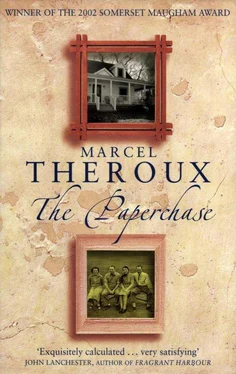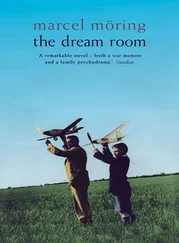I had managed to sleep all night on an empty stomach, but now that I was awake, my hunger was becoming impossible to ignore. I even had that extra sensitivity to smell that comes when you haven’t eaten in a while. I noticed the mustiness in the air, and the way the slight dampness brought out the smell of the timber.
I went downstairs and attempted to make some breakfast. Now, anyone living alone begins to cut comers. You adapt to shortcomings you can’t be bothered to fix. Sometimes, you only notice when guests arrive and you have to explain the bathroom door only closes if you pull it like so; that a certain drawer won’t shut unless you lift it when you slide it in; you have to jiggle the handle of the toilet to get the cistern to fill. But Patrick’s house was only comparable for inconvenience with living in a museum.
The fridge — which contained the collection of ice-cream scoops — was purely ornamental. The cooker hadn’t worked for years and had a gloomy aura all its own — like a wrecked car in a forest. The water wheezed and coughed its way out of the taps. All the kitchen implements were of the oldest available kind. Patrick must have either gone out for every meal, or eaten canned food out of the tin.
There was an enormous pile of tinned food in the larder — enough in fact to keep Patrick going through a nuclear winter — but not much that I felt like eating for breakfast. I saw tinned asparagus, tins of cherries, haggis (vegetarian and non-vegetarian varieties), cassoulet, feijoada, along with a box of wine gums that I remembered buying in Wandsworth for Patrick’s fortieth birthday. I found a bag of coffee beans in there too, but not a grinder that I dared use. There were several elegant-looking hand-operated ones, but they smelled of furniture polish and had rusty or broken mechanisms. Knowing Patrick, the one he actually used would be an ugly piece of 1960s junk that he’d bought for fifty cents at a yard sale, but I couldn’t see anything that fitted this description. In the end, I settled for Postum, of which there were three unopened jars, and added instant coffee to my shopping list.
The picture on the tin of feijoada made it look not unlike baked beans, so I decided to eat that. In the absence of a tin-opener, I had to use a corkscrew to punch a hole in the can. It took me about ten minutes to make an opening big enough to pour out the contents, which turned out to be beans and most of the distinguishing characteristics of a pig. By then I was too hungry to care, and sat on the steps of the house with my Postum, my pig’s snout stew and a box of Ritz crackers, wondering what unnatural instinct had made Patrick turn his own home into such an inhospitable place.
Twenty-eight years earlier, Vivian and I had followed our father up the steps on which I was sitting and been introduced to Patrick for the first time. He towered over us, a taller, swarthier version of my father, his eyes obscured by the sunglasses that he wore habitually, regardless of the weather.
It had been snowing that day. It was the Christmas after my mother died, and we were spending it in America. I suppose my father thought that celebrating it in our customary way in London would just underline her absence.
We were unprepared for the brutal weather. London had been unseasonally warm, but six inches of snow fell in Boston in the hour after we landed: great clouds of it seemed to swarm around the headlights of the other cars. The ferry was delayed for two hours. Vivian and I had no gloves or scarves, so my father bought us some at a drugstore in Hyannis. It was dark when the boat left the harbour; thick and swirling, the snow continued to pour out of the sky and silently extinguish itself in the boat’s black wake. Snow lay along the eaves of our empty guesthouse in Westwich, where the cold cotton sheets looked and felt like snow. Vivian bunched up like an armadillo at the top of his bed to stay warm. I straightened my legs too quickly: it was like standing neckdeep in icy water. My teeth chattered until the bed warmed up. Outside the window, the snow had been scraped into piles; yellow under the street-lamps, they set off the blackness of the Atlantic night.
Early the next morning we drove to Patrick’s. My father struggled with the ignition of the rented car as Vivian and I shivered on its cold vinyl seats. It had started to snow again — tiny flakes of it this time, like salt. By the time we got to Patrick’s house, the path he had cleared across the porch had been dusted over again. His house seemed to disappear into the sky behind it, camouflaged like the black and white of ermine.
My father banged on the door and flapped his arms to keep warm. ‘Cold, huh?’
Patrick appeared. The whole of his nose was swathed in white bandages. Much later, my father explained that he had had an operation to straighten a deviated septum. Along with the dark glasses, the bandages made him look like the Invisible Man. He was easily the most frightening person I’d ever seen in my life.
‘What’s that in your hair?’ he asked.
I said nothing. I was speechless with terror. Vivian was looking at me, his face blotchy white and pink from the cold, swathed in his drugstore hat and muffler.
Patrick bent down and produced a Reese’s peanut butter cup from the air behind my left ear. I burst into tears.
Patrick was mortified. ‘I didn’t mean to scare you. It was just a trick.’ He unwrapped the chocolate. ‘Look, it’s candy!’
‘It’s the bandage,’ said my father. ‘He’s frightened of it.’
Patrick touched it. ‘This? Does it look terrible?’
‘It’s not so bad,’ said my father. Something about my father’s deep voice and the way frozen vapour came out of his mouth made me think of smoke pouring from a censer in church.
Vivian quacked: ‘Your nose looks like a big white doorknob.’
My father took my hand and we followed them over the threshold, me grizzling slightly, not so much from fear as from the feeling that I had disgraced myself with my tears.
The house must have been very different then. There would have been much less in it. It seems a trite thing to observe, but Patrick only began collecting things in earnest when he’d given up on human beings. In those days, the eccentricities that eventually made the kitchen useless were so far from conquering it that Patrick was able to cook Christmas dinner for five. The fifth person was Patrick’s girlfriend Lydia. She was frail-looking with a bun of blond hair. She called him Paddy and cracked open walnuts with the heel of her clog.
Together she and Patrick had cut down a tree which they had decorated with ribbons, and candy canes, and Christmas biscuits that were as hard as plywood.
It was a subdued occasion. We ate much of the dinner in silence. I was too young to understand fully, but I think I sensed it was a reconciliation of some sort between Patrick and my father.
My father insisted on going for a walk on the beach after lunch before we opened our presents. Patrick and Lydia sat drinking whisky by the fire.
The sea was grey and foamy, churning up the beach. Even the sand dunes had a grey, damp look, like heaps of aggregate at a building site.
‘I don’t want you to be disappointed if you don’t like what Patrick gives you,’ my father explained. ‘He doesn’t understand small children very well.’
‘But why not, Dad? Why doesn’t he?’ said Vivian.
Something foul and fishy had been deposited by the sea high up on the beach and half covered with sand. We were poking at it with sticks.
‘I want you both to behave very well,’ my father said, ‘so that when you leave Patrick will think to himself: What nice children! I think I’d like to have some of those myself.’
It was a sensible warning. Patrick gave Vivian and me Harvard sweatshirts that were about eight sizes too big. If I still had mine, I would still be waiting to grow into it. But I heeded my father’s words and said nothing. Vivian couldn’t conceal his disappointment. ‘It’s a wearing present,’ he said. ‘I hate wearing presents.’
Читать дальше












